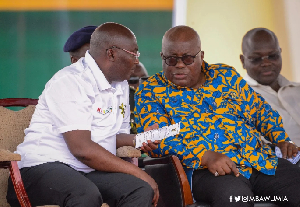Accra, March 4, GNA - A Senior Lecturer at the Economics Department of the University of Ghana, Augustine Gockel on Friday questioned the low savings interest rate, saying it was a disincentive to the public to save at the banks.
Savings deposit rates were such that customers lost significantly, Dr Gockel said.
He said the structure of the real interest rates for savings from December 2003 to December 2004 showed a consistent nosedive indicating a negative rate.
A document of Mr Gockel's analysis of the 2005 Budget copied to the Ghana News Agency, said as of December last year, the real interest rate on saving stood at -2.06 per cent.
This negative interest rate picture, according to the statistics he presented, occurred throughout 2003.
He presented his paper at a day's seminar on the 2005 Budget organised by the Institute of Statistical, Social and Economic Research (ISSER) in collaboration with CAL Merchant Bank.
Mr Gockel said interest spreads and the real cost of capital remained high, particularly for small and medium-size enterprise, which might constrain credit growth to the private sector.
On Treasury-Bill rates, he said all the three, the 91-day, 182-day and 0ne-year notes, declined to 17.08 per cent, 17.85 per cent and 17.85 per cent, in that order.
Mr Gockel said in real terms, as of December last year the rate was about 4.27 per cent but the return on long-term instruments such as the one-year note was now greater than the short-term 91-day and 182-day notes.
He said lending rates were high both in nominal and real terms. Besides, the spread between borrowing and lending rates was still high. Touching on inflation, Dr Gockel said high and variable inflation pressures had negative effects on financial intermediation and private capital formation.
He said because of cost irreversibility and asymmetric adjustment cost, inflation discouraged long-term investments.
Mr Gockel said generally the rate of the deprecation of the Cedi against the dollar had been marginal, both on the inter-bank market and the forex bureaux market.
The Cedi, he said, depreciated by 2.2 per cent in 2004 against the dollar, the lowest since the foreign exchange market was liberalized.
Business News of Friday, 4 March 2005
Source: GNA
















